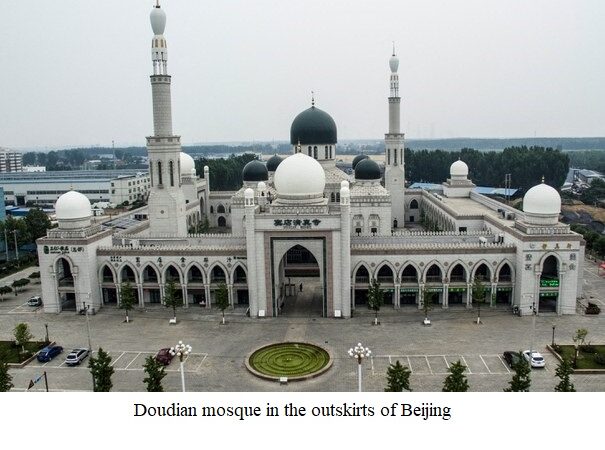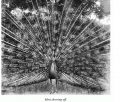China remodels major mosque in Beijing to remove Middle Eastern influence

Authorities in Beijing are ‘renovating’ a major mosque to remove traces of the Arabic language and Middle Eastern designs, so as to comply with the ruling Chinese Communist Party (CCP)’s ‘sinicization of religion’ policies, RFA has learned.
Doudian Mosque, with its arabesque cupolae and minarets, was the newest and largest mosque in Beijing, and was built with funds donated by Beijing Muslims, according to a forum post on the online Muslim community website Ummah.
“The architecture and decoration of this mosque represents a hybrid of the classical Islamic form, with a healthy dose of indigenous architectural and decorative elements to satisfy the demand for a sinicized form of Islam,” academic Lloyd Ridgeon wrote in a 2020 edition of the Journal of Minority Muslim Affairs, referring to Doudian Mosque in the Beijing suburb of Fangshan.
“The recent fear of Islam has indeed resulted in mosque design increasingly reflecting a Chinese flavour than a typically Middle-Eastern one,” the article said.
“In Henan province … domes have been removed from mosques, along with crescent and star shaped symbols. Such actions reflect the push for sinicization of religions.”
China’s five-year plan for the sinicization of Islam, will focus on requiring mosques to to uphold “core values of socialism, traditional culture, laws and regulations,” according to a January 2019 conference organized by the CCP’s United Front Work Department.
Mosques have been told to “guide, mobilize and inspire” Chinese Muslims with lectures and training sessions on such topics, and which uphold the spirit of a sinicized Islam by using examples of notable figures.
Beijing-based religious scholar Xi Wuyi recently posted photos and descriptions of the renovations at the Doudian Mosque, adding that they show “the orderly progress of … sinicization of religion in China.”
‘Rectification’ work
It is understood that the “”rectification” work to remove visible links to Arab and Middle Eastern culture started last month and is expected to be completed on May 1, 2023.
Shih Chien-yu, a national security expert and researcher at Taiwan’s Society of Central Asian Studies, said there has been a tendency among Chinese Muslims since the economic reforms of late supreme leader Deng Xiaoping to lean towards more Arab-influenced designs in mosque architecture.
“It has all been done according to the way it’s done in the Arab world,” Shih told RFA. “Also a lot of the funds for construction have been donated by foreign countries.”
Completed in 2013, Doudian Mosque covers an area of ??nearly 15,000 square meters and can accommodate 1,500 worshippers at the same time, making it the biggest mosque in northern China.
According to Shih, the design was approved by Wang Zhengwei, then director of China’s National Ethnic Affairs Commission.
“Wang Zhengwei was seen as a traditional supporter of autonomy for the ethnic minority regions, which is completely at odds with [current CCP leader] Xi Jinping’s attitude towards the issue, and towards religion,” he said.
“They are demolishing the foreign architectural styles of the mosques built during that time and restoring the more [Chinese] green tile, flying cornices mosque architecture,” Shih said.
In July 2021, authorities in the western province of Qinghai announced the “rectification” of the 700-year-old Dongguan Mosque in Xining.
Control is the goal
Wang Yang, chairman of the National Committee of the Chinese People’s Political Consultative Conference advisory body, visited Qinghai two months ago, with footage of him visiting the mosque aired by state broadcaster CCTV at the time.
According to Shih, the Doudian Mosque is part of the same “sinicization” program.
“The authorities believe that this way, all the different religious beliefs in China can be placed under the control of the Chinese government,” Shih said. “Under the guidance [of the CCP], any ideas or interpretations from outside are illegal.”
“They are using this as a symbolic way to establish the idea that you have to follow the party,” he said.
World Uyghur Congress spokesman Dilxat Raxit said the move is part of a bid to eliminate religious beliefs, rather than making them more Chinese, however.
“China is … using administrative means to eliminate people’s religious beliefs in a planned and purposeful manner,” Raxit told RFA.
“As China’s political center, Beijing is sending a strong message to the world with its ‘rectification’ of mosques, which is that China will continue with the sinicization of Islam policy, and won’t be backing down due to external pressure,” he said.
—-From Radio Free Asia (RFA)
https://www.rfa.org/english/news/china/beijing-mosque-09132022145624.html
-
Book Shelf
-
 Book Review
DESTINY OF A DYSFUNCTIONAL NUCLEAR STATE
Book Review
DESTINY OF A DYSFUNCTIONAL NUCLEAR STATE
- Book ReviewChina FO Presser Where is the fountainhead of jihad?
- Book ReviewNews Pak Syndrome bedevils Indo-Bangla ties
- Book Review Understanding Vedic Equality….: Book Review
- Book Review Buddhism Made Easy: Book Review
- Book ReviewNews Elegant Summary Of Krishnamurti’s teachings
- Book Review Review: Perspectives: The Timeless Way of Wisdom
- Book ReviewNews Rituals too a world of Rhythm
- Book Review Marx After Marxism
- Book Review John Updike’s Terrorist – a review
-
-
Recent Top Post
-
 CommentariesTop Story
India’s Migration Dilemma
CommentariesTop Story
India’s Migration Dilemma
-
 Commentaries
Crowd Management Blues
Commentaries
Crowd Management Blues
-
 Meher Baba SpeaksNews
Meher Baba Loved Them Too…
Meher Baba SpeaksNews
Meher Baba Loved Them Too…
- Commentaries Record Pentagon spending bill and America’s hidden nuclear rearmament
-
 CommentariesNews
Ides of trade between India and Pakistan
CommentariesNews
Ides of trade between India and Pakistan
-
 Commentaries
How sustainable is the rhetoric of India-China Bhai-Bhai
Commentaries
How sustainable is the rhetoric of India-China Bhai-Bhai
-
 CommentariesTop Story
New Set of Diplomatic Strains with Canada
CommentariesTop Story
New Set of Diplomatic Strains with Canada
-
 News
Ratan Tata’s Legacy
News
Ratan Tata’s Legacy
-
 Commentaries
India’s Strategic Push on the World Stage
Commentaries
India’s Strategic Push on the World Stage
- Commentaries Veils of Resistance
-
AdSense code
















